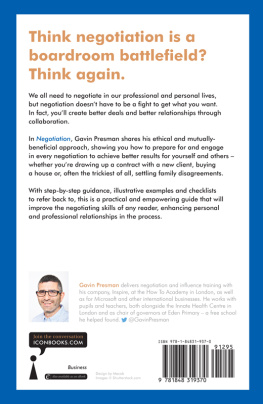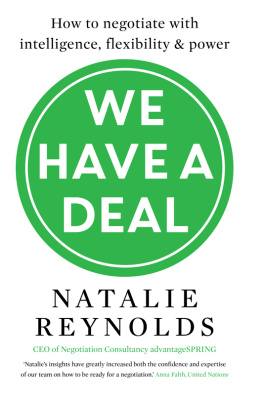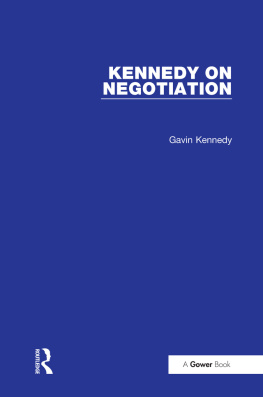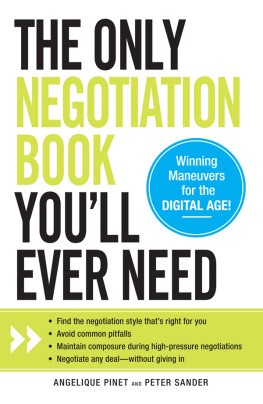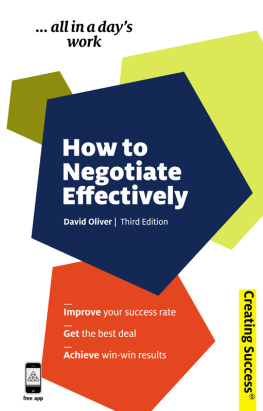I Win, You Win
The essential guide to principled negotiation
Carl Lyons

First published in Great Britain 2012
Copyright Carl Lyons 2012
This electronic edition published 2012 by Bloomsbury Publishing Plc
The right of Carl Lyons to be identified as the author of this work has been asserted by him in accordance with the Copyright, Designs and Patents Act 1988
All rights reserved. You may not copy, distribute, transmit, reproduce or otherwise make available this publication (or any part of it) in any form, or by any means (including without limitation electronic, digital, optical, mechanical, photocopying, printing, recording or otherwise), without the prior written permission of the publisher. Any person who does any unauthorised act in relation to this publication may be liable to criminal prosecution and civil claims for damages.
Bloomsbury Publishing Plc, 50 Bedford Square, London WC1B 3DP
A CIP catalogue record for this book is available from the British Library
eISBN 978 1 4081 8127 0
www.bloomsbury.com
Visit www.bloomsbury.com to find out more about our authors and their books. You will find extracts, authors interviews, author events and you can sign up for newsletters to be the first to hear about our latest releases and special offers.
Contents
For Don and Janet Lyons, my parents, mentors and role models who through their example have taught me the power of integrity.
There are a number of people I want to thank for helping me in the writing of this book. Michele Baylis for her support, inspiration and belief; Fiona Pusey for generously sharing her knowledge and for some of the material in the communication chapters; Jason Melville for openly sharing his experiences and for the case study in
1
Focus on Values and Interests, Not Positions
W eve already described how, more often than not, people tend to approach negotiations with a position in mind. The negotiator can become ego identified with the position and shifting from this will be associated with giving something up, making concessions or losing face. Consider two women in a restaurant. They are arguing over whether the door should be open or closed. The waitress comes over and politely asks them both to explain their reasons. One wants the fresh air that would be provided by the door open, the other wants it closed to avoid the draught. The waitress thinks for a while and then opens a window at the back of the restaurant. This not only prevents a draught from reaching the diners but also provides fresh air. Both diners are satisfied with the outcome. Without understanding the values of each party it would have been very easy to get locked into a positional stance about whether the door should be open or closed.
The more we identify with a position, the harder it is to move and the more it takes attention from the real, underlying interests that we are trying to satisfy. Behind every position there is a value. If you want your kids to go to bed at 8.30, then that position reflects an interest that may be about getting some time on your own, instilling discipline or making sure your kids get enough sleep. 8.30 is the position you take, but the interests are the things you really want to satisfy. In the earlier example of the sisters and the orange it is clear that if an analysis of their values, or interests had been made, then a much more elegant solution could have been found. One sister would have taken the peel for cooking and the other sister the fruit for eating. This would have satisfied both parties and would have been an efficient and waste-free outcome. The key to effective negotiation lies in looking behind the positions and identifying the values and interests that need to be satisfied.
The things that people want to satisfy operate at a number of different levels. Ive called them values and interests. Values are those core human needs such as security, achievement, health, creativity or freedom. Interests are the things you wish to satisfy right now such as maximising the selling price, not sitting in a draught, getting a piece of orange peel as a cooking ingredient or getting the kids to bed on time. But notice that the interests are an extension of the values. You may wish to maximise the selling price to provide you with financial security or a sense of achievement; you may not want to sit in the draught because you value your health; you want the orange peel because cooking is the way that you satisfy your creative urges; you may be interested in getting the kids to bed on time because you value the freedom you get from the time on your own or with your partner. Your current interests are always attempting to satisfy something that you value. Understanding this relationship is a key first step in understanding your behaviour in negotiations. This holds true for you and for the other party.
Before you attempt to identify the other sides values you must first of all be clear about your own. This may not be as obvious as it seems as we often have multiple values that exist at a number of different levels. Values provide us with a feeling of right or wrong about things: they are deeply embedded in our unconscious thinking processes and were formed very early in our lives through our upbringing and other formative influences. These provide us with a general background attitude towards life and can be seen reflected in our behaviour. For example, if financial security is a primary value, you will attempt to satisfy this in the key areas of your life. This will be reflected through your actions and you will satisfy this desire for financial security before, and sometimes at the expense of, other values. So, you may do a job that is unfulfilling but secure if security is a stronger value than self-expression. Your feeling of satisfaction and contentment will be linked to the level of financial security you feel, not only in your professional life, but perhaps also in your personal life.
At a more immediate level, you will have particular interests to satisfy. These will be an out-flowing or an extension of the more core values we have just described. For example, you may have an interest in tidying your house because you value a clean and ordered environment. Notice that behaviour is driven by a need to satisfy these underlying interests and values. This relationship between our values, interests and behaviour is at the heart of making effective agreements.
Identify your values
Before attempting to identify the values and interests of the other party, it is important to be clear about your own. Values are those really fundamental things that give you a sense of right and wrong in life and need to somehow be satisfied otherwise a sense of lack will result. In one way or another we are forever trying to satisfy those values that we feel most strongly about. To identify your own values answer the following questions:
- What are the things that are most important to you?
- What are the things that have consistently driven your behaviour in life?
- What would you like to be remembered for?
Write down the answers to these questions and see if you can identify any patterns in your life. If you are still having trouble identifying your core values, have a look at the list below and choose the three things that you identify most strongly with. Make the list, then put them in priority order in terms of strength of preference. When you have your shortlist, test them against your behaviour. What do your actions over time tell you about your values? For example, if you are identifying adventure and freedom as your core values, yet you are in an unfulfilling job, working for somebody else, with little autonomy, then there are some values stronger than adventure and freedom driving you. It may be responsibility or it may be financial security. Identify what you are demonstrating consistently through your actions and you will have a good idea of the values that you are satisfying.


